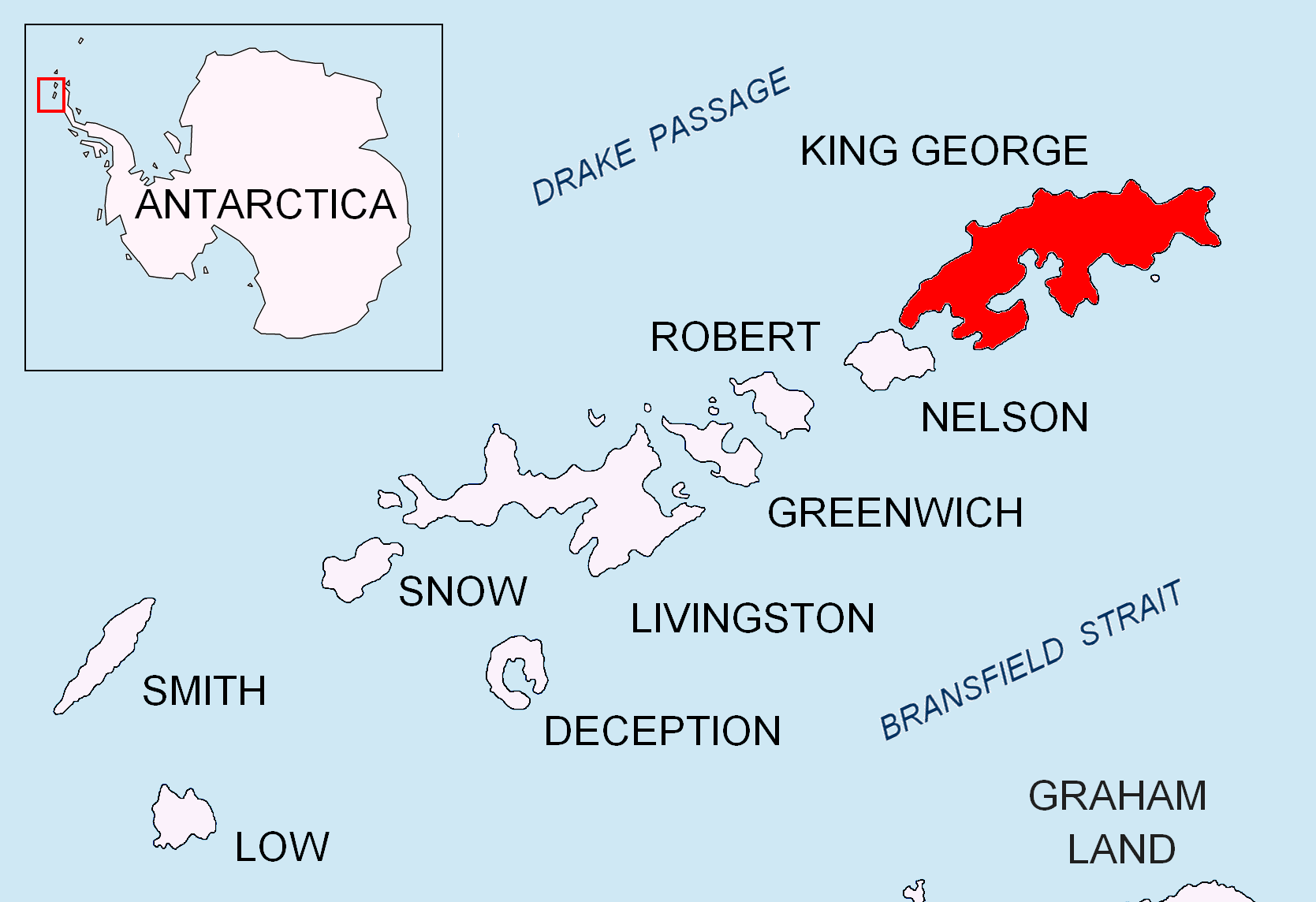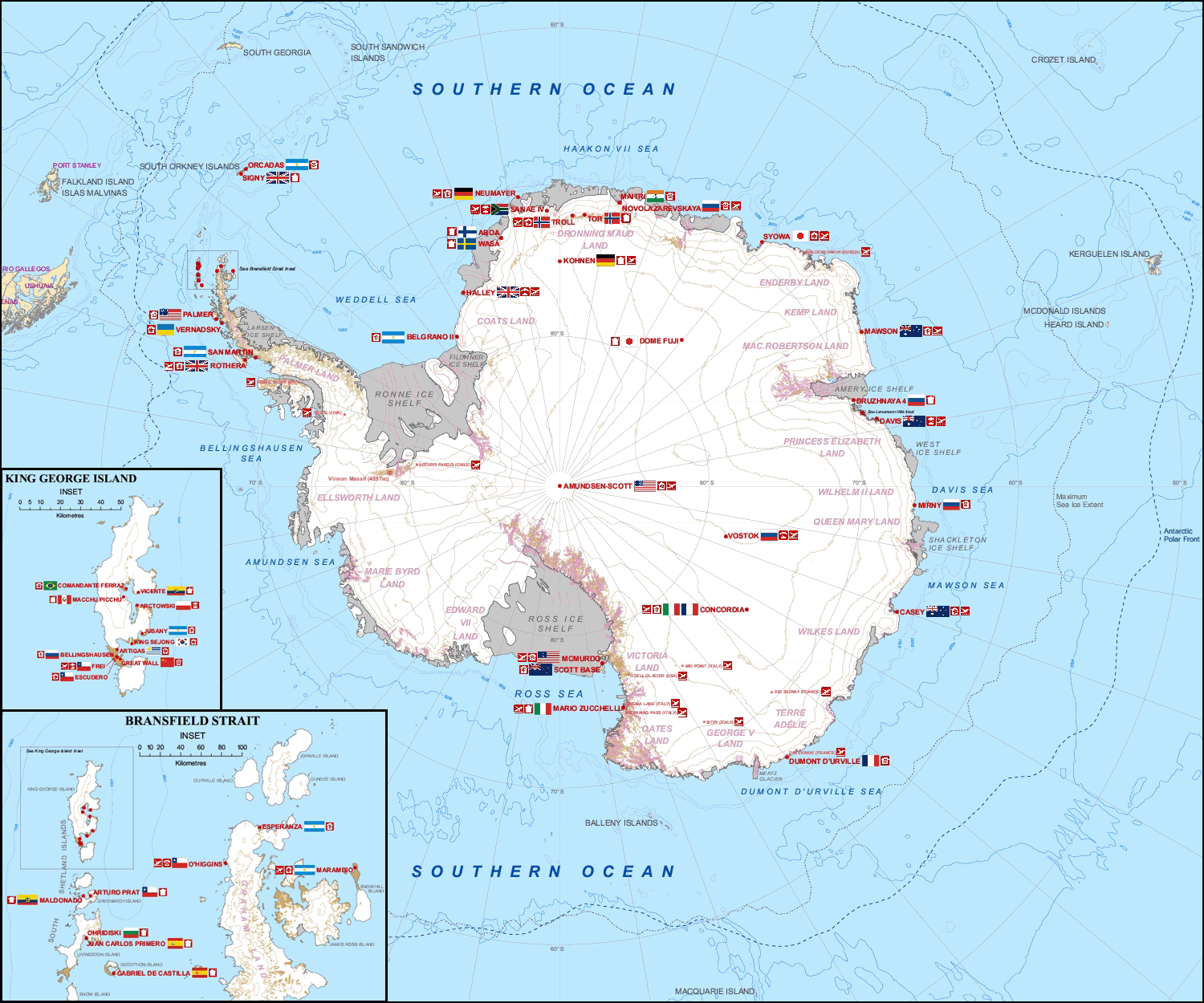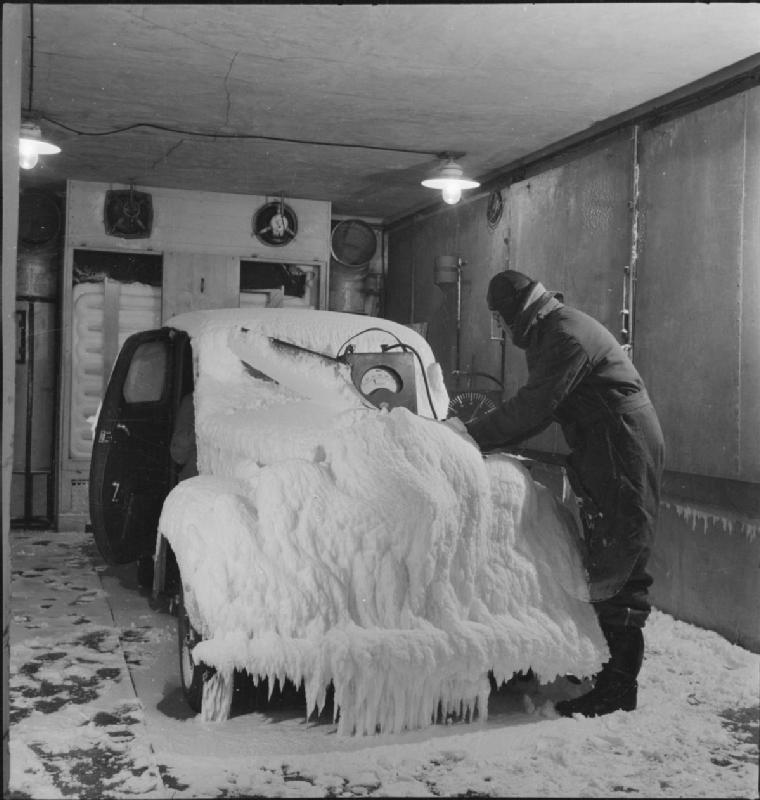|
Artigas Base
The General Artigas Station ( es, Base Científica Antártica Artigas), also referred to as the Artigas Base is the larger of the two Uruguayan scientific research stations in Antarctica, the other one being Elichiribehety Base. It is one of the 68 bases in Antarctica. Organization The Artigas Base depends on the Uruguayan Antarctic Institute Plans & Operations Direction which is ruled by an Interministerial Council, with delegates of MoD, Foreign Affairs and ministry of Education and Culture. Uruguay, a Consultative member of Antarctic Treaty since 7 October 1985, has a permanent, active and autonomous activity as a National Governmental Program in Antarctic. It comes to effect operating an all year round station in King George Island, South Shetland, and seasonally at Antarctic Peninsula, and onboard its vessel, where performs scientific activity based on SCAR & Treaty needs and recommendations, supported by own logistic sea and air transport, and operating under COMNAP g ... [...More Info...] [...Related Items...] OR: [Wikipedia] [Google] [Baidu] |
Research Stations In Antarctica
Multiple governments have set up permanent research stations in Antarctica and these bases are widely distributed. Unlike the drifting ice stations set up in the Arctic, the research stations of the Antarctic are constructed either on rock or on ice that is (for practical purposes) fixed in place. Many of the stations are staffed throughout the year. A total of 42 countries (as of October 2006), all signatories to the Antarctic Treaty, operate seasonal (summer) and year-round research stations on the continent. The population of people performing and supporting scientific research on the continent and nearby islands varies from approximately 4,000 during the summer season to 1,000 during winter (June). In addition to these permanent stations, approximately 30 field camps are established each summer to support specific projects. History First bases During the Heroic Age of Antarctic Exploration in the late 19th century, the first bases on the continent were established ... [...More Info...] [...Related Items...] OR: [Wikipedia] [Google] [Baidu] |
COMNAP
Council of Managers of National Antarctic Programs (COMNAP) is the international association, formed in 1988, which brings together the National Antarctic Programs. National Antarctic Programs are those organizations that have responsibility for delivering and supporting scientific research in the Antarctic Treaty Area on behalf of their respective governments and in the spirit of the Antarctic Treaty. Its secretariat is in Christchurch, New Zealand. COMNAP has an observer status at the Antarctic Treaty System's yearly Antarctic Treaty Consultative Meetings (ATCM). See also * Scientific Committee on Antarctic Research * Michelle Rogan-Finnemore Michelle Rogan-Finnemore is a New Zealand-American science administrator, and currently the Executive Secretary of the Council of Managers of National Antarctic Programmes (COMNAP) which is the international association which brings together th ..., Executive Secretary References External links COMNAP Web Site{{Authority control A ... [...More Info...] [...Related Items...] OR: [Wikipedia] [Google] [Baidu] |
Outposts Of The South Shetland Islands
''Outposts: Journeys to the surviving relics of the British Empire'' is a book by Simon Winchester. It details his travels to each of the remaining dependencies of the British Empire and was first published in 1985 in Britain by Hodder and Stoughton under the title ''Outposts'' and in the United States by Prentice Hall as ''The Sun Never Sets: Travels to the Remaining Outposts of the British Empire''. It was reprinted in 2003 with a new foreword written to address the changing political climate and attitudes in relation to the British Empire, most importantly concerning the handover of Hong Kong to China and, more generally, the rise of globalism. Publication history *''Outposts: Journeys to the Surviving Relics of the British Empire'' (1985), Hodder & Stoughton *''The Sun Never Sets: Travels to the Remaining Outposts of the British Empire'' (1985), Prentice Hall *''Outposts: Journeys to the Surviving Relics of the British Empire'' revised ed. (2003), Penguin Penguins (o ... [...More Info...] [...Related Items...] OR: [Wikipedia] [Google] [Baidu] |
Antarctic Field Camps
Many Antarctic research stations support satellite field camps which are, in general, seasonal camps. The type of field camp can vary – some are permanent structures used during the annual Antarctic summer, whereas others are little more than tents used to support short term activities. Field camps are used for many things, from logistics (Sky Blu) to dedicated scientific research ( WAIS Divide Field Camp). List of field camps See also *Research stations in Antarctica * Demographics of Antarctica *List of Antarctic expeditions This list of Antarctic expeditions is a chronological list of expeditions involving Antarctica. Although the existence of a southern continent had been hypothesized as early as the writings of Ptolemy in the 1st century AD, the South Pole was ... * Transport in Antarctica References External links COMNAP Antarctic Facilities() COMNAP Antarctic Facilities Map() Antarctic Digital Database Map ViewerSCAR {{Polar exploration Fiel ... [...More Info...] [...Related Items...] OR: [Wikipedia] [Google] [Baidu] |
Winter Diesel Fuel
Winter diesel fuel (also known as ''winter diesel'', alpine diesel, or winterised diesel) refers to diesel fuel enhanced to prevent it from gelling in cold weather conditions. In general it is achieved by treatment with additives that change the low temperature characteristics of the fuel. Operation Diesel fuel is prone to ''waxing'' or ''gelling'' in cold weather; both are terms for the solidification of diesel oil into a partially crystalline state. Below the Cloud Point the fuel begins to develop solid wax particles giving it a cloudy appearance. The presence of solidified waxes thickens the oil and clogs fuel filters and injectors in engines. The crystals build up in the fuel line (especially in fuel filters) until the engine is starved of fuel, causing it to stop running. The Cold Filter Plugging Point (CFPP) is based on a standardized test that indicates the rate at which diesel fuel will flow through a standardized filtration device in a specified length of time when cool ... [...More Info...] [...Related Items...] OR: [Wikipedia] [Google] [Baidu] |
CCAMLR
The Convention on the Conservation of Antarctic Marine Living Resources, also known as the Commission for the Conservation of Antarctic Marine Living Resources, and CCAMLR, is part of the Antarctic Treaty System. The convention was opened for signature on 1 August 1980 and entered into force on 7 April 1982 by the Commission for the Conservation of Antarctic Marine Living Resources, headquartered in Tasmania, Australia. The goal is to preserve marine life and environmental integrity in and near Antarctica. It was established in large part to concerns that an increase in krill catches in the Southern Ocean could have a serious impact on populations of other marine life which are dependent upon krill for food. In 1989, CCAMLR set up the Ecosystem Monitoring Program (CEMP) to further monitor the effects of fishing and harvesting of species in the area. On 19 October 2022, Ecuador became a New Member of the Commission, the 26th member of the CCAMLR. Member states Marine Pr ... [...More Info...] [...Related Items...] OR: [Wikipedia] [Google] [Baidu] |
Working Group
A working group, or working party, is a group of experts working together to achieve specified goals. The groups are domain-specific and focus on discussion or activity around a specific subject area. The term can sometimes refer to an interdisciplinary collaboration of researchers working on new activities that would be difficult to sustain under traditional funding mechanisms (e.g., federal agencies). The lifespan of a working group can last anywhere between a few months and several years. Such groups have the tendency to develop a ''quasi-permanent existence'' when the assigned task is accomplished; hence the need to disband (or phase out) the working group when it has achieved its goal(s). A working group's performance is made up of the individual results of all its individual members. A team's performance is made up of both individual results and collective results. In large organisations, working groups are prevalent, and the focus is always on individual goals, performan ... [...More Info...] [...Related Items...] OR: [Wikipedia] [Google] [Baidu] |
Scientific Committee On Antarctic Research
The Scientific Committee on Antarctic Research (SCAR) is an interdisciplinary body of the International Science Council (ISC). SCAR coordinates international scientific research efforts in Antarctica, including the Southern Ocean. SCAR's scientific work is administered through several discipline-themed ''science groups''. The organisation has observer status at, and provides independent advice to Antarctic Treaty Consultative Meetings, and also provides information to other international bodies such as the Intergovernmental Panel on Climate Change (IPCC) and the United Nations Framework Convention on Climate Change (UNFCCC). History At the International Council of Scientific Unions (ICSU)’s Antarctic meeting held in Stockholm from 9–11 September 1957, it was agreed that a committee should be created to oversee scientific research in Antarctica. At the time there were 12 nations actively conducting Antarctic research and they were each invited to nominate one delegate to ... [...More Info...] [...Related Items...] OR: [Wikipedia] [Google] [Baidu] |
South Shetland
The South Shetland Islands are a group of Antarctic islands with a total area of . They lie about north of the Antarctic Peninsula, and between southwest of the nearest point of the South Orkney Islands. By the Antarctic Treaty of 1959, the islands' sovereignty is neither recognized nor disputed by the signatories and they are free for use by any signatory for non-military purposes. The islands have been claimed by the United Kingdom since 1908 and as part of the British Antarctic Territory since 1962. They are also claimed by the governments of Chile (since 1940, as part of the Antártica Chilena province) and Argentina (since 1943, as part of Argentine Antarctica, Tierra del Fuego Province). Several countries maintain research stations on the islands. Most of them are situated on King George Island, benefitting from the airfield of the Chilean base Eduardo Frei. There are sixteen research stations in different parts of the islands, with Chilean stations being ... [...More Info...] [...Related Items...] OR: [Wikipedia] [Google] [Baidu] |





